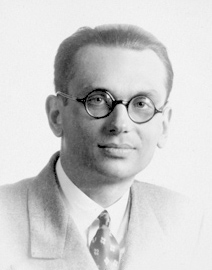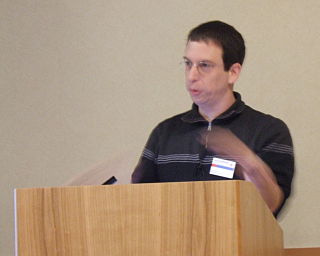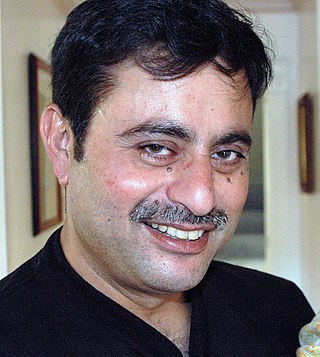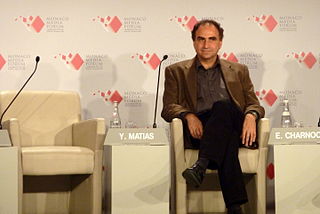Related Research Articles

Kurt Friedrich Gödel was a logician, mathematician, and philosopher. Considered along with Aristotle and Gottlob Frege to be one of the most significant logicians in history, Gödel profoundly influenced scientific and philosophical thinking in the 20th century, building on earlier work by Richard Dedekind, Georg Cantor and Gottlob Frege.

Gödel, Escher, Bach: an Eternal Golden Braid, also known as GEB, is a 1979 book by Douglas Hofstadter.
The Gödel Prize is an annual prize for outstanding papers in the area of theoretical computer science, given jointly by the European Association for Theoretical Computer Science (EATCS) and the Association for Computing Machinery Special Interest Group on Algorithms and Computational Theory. The award is named in honor of Kurt Gödel. Gödel's connection to theoretical computer science is that he was the first to mention the "P versus NP" question, in a 1956 letter to John von Neumann in which Gödel asked whether a certain NP-complete problem could be solved in quadratic or linear time.
Johan Torkel Håstad is a Swedish theoretical computer scientist most known for his work on computational complexity theory. He was the recipient of the Gödel Prize in 1994 and 2011 and the ACM Doctoral Dissertation Award in 1986, among other prizes. He has been a professor in theoretical computer science at KTH Royal Institute of Technology in Stockholm, Sweden since 1988, becoming a full professor in 1992. He is a member of the Royal Swedish Academy of Sciences since 2001.

Manindra Agrawal is an Indian computer scientist and professor at the Department of Computer Science and Engineering at the Indian Institute of Technology, Kanpur. He was the recipient of the first Infosys Prize for Mathematics, the Godel Prize in 2006; and the Shanti Swarup Bhatnagar Award in Mathematical Sciences in 2003. He has been honoured with Padma Shri, India's 4th highest civilian award, in 2013.
Steven Rudich (born October 4, 1961) is a professor in the Carnegie Mellon School of Computer Science. In 1994, he and Alexander Razborov proved that a large class of combinatorial arguments, dubbed natural proofs, was unlikely to answer many of the important problems in computational complexity theory. For this work, they were awarded the Gödel Prize in 2007. He also co-authored a paper demonstrating that all currently known NP-complete problems remain NP-complete even under AC0 or NC0 reductions.

The Association for Symbolic Logic (ASL) is an international organization of specialists in mathematical logic and philosophical logic. The ASL was founded in 1936, and its first president was Curt John Ducasse. The current president of the ASL is Phokion Kolaitis.

Dan Boneh is an Israeli–American professor in applied cryptography and computer security at Stanford University.

Rajeev Motwani was an Indian American professor of Computer Science at Stanford University whose research focused on theoretical computer science. He was a special advisor to Sequoia Capital. He was a winner of the Gödel Prize in 2001.
Shang-Hua Teng is a Chinese-American computer scientist. He is the Seeley G. Mudd Professor of Computer Science and Mathematics at the University of Southern California. Previously, he was the chairman of the Computer Science Department at the Viterbi School of Engineering of the University of Southern California.
Daniel Alan Spielman has been a professor of applied mathematics and computer science at Yale University since 2006. As of 2018, he is the Sterling Professor of Computer Science at Yale. He is also the Co-Director of the Yale Institute for Network Science, since its founding, and chair of the newly established Department of Statistics and Data Science.
Alistair Sinclair is a British computer scientist and computational theorist.

Cynthia Dwork is an American computer scientist best known for her contributions to cryptography, distributed computing, and algorithmic fairness. She is one of the inventors of differential privacy and proof-of-work.

The Journal of Computer and System Sciences (JCSS) is a peer-reviewed scientific journal in the field of computer science. JCSS is published by Elsevier, and it was started in 1967. Many influential scientific articles have been published in JCSS; these include five papers that have won the Gödel Prize. Its managing editor is Michael Segal.

Yossi Matias is an Israeli-American computer scientist, entrepreneur and Google executive.

Timothy Avelin Roughgarden is an American computer scientist and a professor of Computer Science at Columbia University. Roughgarden's work deals primarily with game theoretic questions in computer science.
Fotios Zaharoglou is a Greek computer scientist. He received his Diploma in Electrical Engineering from Aristotle University of Thessaloniki in 1986, his MS in Electrical Engineering from the California Institute of Technology in 1987, and his PhD in Computer Science from the University of California, San Diego in 1993. His work on the applications of topology to the theory of distributed computing along with Maurice Herlihy, Michael Saks and Nir Shavit, was awarded the 2004 Gödel Prize.
Kobbi Nissim is a computer scientist at Georgetown University, where he is the McDevitt Chair of Computer Science. His areas of research include cryptography and data privacy. He is known for the introduction of differential privacy.
Frank McSherry is a computer scientist. McSherry's areas of research include distributed computing and information privacy.
References
- ↑ Chita, Efi. "2017 Gödel Prize". Eatcs.org. Retrieved 19 Oct 2020.